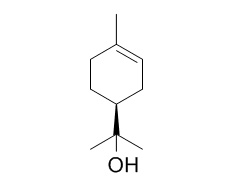Alpha-Terpineol
Alpha-Terpineol has antitumour, anti-inflammatory, and antimicrobial activities, it inhibits the growth of tumour cells through a mechanism that involves inhibition of the NF-kappaB pathway; it can suppress the production of inflammatory mediators in LPS-stimulated human macrophages by interfering with the NF-kB, p38 or ERK MAPK pathways. Alpha-Terpineol may have utility as an anti-MRSA cleansing agent for dental instruments and dental unit chairs.
Inquire / Order:
manager@chemfaces.com
Technical Inquiries:
service@chemfaces.com
Tel:
+86-27-84237783
Fax:
+86-27-84254680
Address:
1 Building, No. 83, CheCheng Rd., Wuhan Economic and Technological Development Zone, Wuhan, Hubei 430056, PRC
Providing storage is as stated on the product vial and the vial is kept tightly sealed, the product can be stored for up to
24 months(2-8C).
Wherever possible, you should prepare and use solutions on the same day. However, if you need to make up stock solutions in advance, we recommend that you store the solution as aliquots in tightly sealed vials at -20C. Generally, these will be useable for up to two weeks. Before use, and prior to opening the vial we recommend that you allow your product to equilibrate to room temperature for at least 1 hour.
Need more advice on solubility, usage and handling? Please email to: service@chemfaces.com
The packaging of the product may have turned upside down during transportation, resulting in the natural compounds adhering to the neck or cap of the vial. take the vial out of its packaging and gently shake to let the compounds fall to the bottom of the vial. for liquid products, centrifuge at 200-500 RPM to gather the liquid at the bottom of the vial. try to avoid loss or contamination during handling.
Pharmaceuticals (Basel).2024, 17(6):727.
Phytomedicine.2023, 116:154841.
J Sep Sci.2019, 42(21):3352-3362
Nanotechnology.2024, ad470d.
Thorac Cancer.2023, 14(21):2007-2017.
Evid Based Complement Alternat Med.2021, 2021:5585692.
Int J Mol Sci.2024, 25(20):11227.
Huazhong Agricultural University2022, pp34.
Pharmacol Rep.2020, 72(2):472-480.
Int J Mol Sci.2023, 24(20):15320.
Related and Featured Products
Int J Oral Biol. 2013 Jun;38(2):51-54.
Antimicrobial Effects of Linalool and alpha-Terpineol against Methicillin-Resistant Staphylococcus aureus Isolated from Korean. [Reference:
WebLink]
Methicillin-resistant Staphylococcus aureus (MRSA) is one of the important causative microbes for nosocomial infection and has been isolated from the dental environment. The purpose of this study was to investigate the antimicrobial activity of linalool and Alpha-Terpineol against MRSA isolates from a Korean population. In the experiments, we determined the minimum inhibitory concentrations (MICs) and minimum bactericidal concentrations (MBCs) of these two compounds against 18 strains of MRSA. The data revealed that the MIC90/MBC90 values of linalool and Alpha-Terpineol against MRSA were >12.8 mg/ml and 6.4 mg/ml, respectively. These results indicate that Alpha-Terpineol has more potent antimicrobial activity against MRSA than linalool and may have utility as an anti-MRSA cleansing agent for dental instruments and dental unit chairs.
Anticancer Res. 2010 Jun;30(6):1911-9.
Alpha-terpineol: a potential anticancer agent which acts through suppressing NF-kappaB signalling.[Pubmed:
20651334]
Alpha-Terpineol is a bioactive component of Salvia libanotica essential oil extract and has shown antitumour activity.
METHODS AND RESULTS:
The cytotoxicity of alpha terpineol towards different tumour cell lines was evaluated in vitro. Mechanistic characterization was performed using analysis of drug activity in a cell line panel and drug-induced gene expression perturbation using the connectivity map approach. The small cell lung carcinoma was the cell line most sensitive to alpha terpineol. The results proposed Alpha-Terpineol as an NF-kappaB inhibitor, which was confirmed by the observed dose-dependent inhibition of NF-kappaB translocation and activity using two NF-kappaB assays, and by the down-regulation of the expression of several NF-kappaB-related genes such as IL-1 beta and IL1R1.
CONCLUSIONS:
The results suggest that Alpha-Terpineol inhibits the growth of tumour cells through a mechanism that involves inhibition of the NF-kappaB pathway.
Inflamm Res. 2014 Sep;63(9):769-78.
Terpinen-4-ol and alpha-terpineol (tea tree oil components) inhibit the production of IL-1β, IL-6 and IL-10 on human macrophages.[Pubmed:
24947163]
Tea tree oil (TTO) is an essential oil with anti-inflammatory properties, steam distilled from the plant Melaleuca alternifolia. We investigated the immunomodulatory properties of TTO and its components (terpinen-4-ol and Alpha-Terpineol) using lipopolysaccharide (LPS)-stimulated macrophages.
METHODS AND RESULTS:
The ability of TTO, terpinen-4-ol and Alpha-Terpineol to modulate the macrophage response to bacterial LPS stimulation was assessed by ELISA for tumor necrosis factor (TNF)-α, interleukin (IL)-1β, IL-6 and IL-10 cytokine production and by western blotting for the activation of nuclear factor kappa B (NF-κB) and p38 mitogen-activated protein kinase (MAPK) signaling, which are associated with the expression of pro-inflammatory cytokines. We used a human monocytic cell line (U937) differentiated into macrophages. LPS induced the production of all cytokines, and TTO and its components significantly reduced the production of IL-1β, IL-6 and IL-10. The production of TNF-α was not affected by either TTO or its major components. The modulation of cytokine production was not mediated by changes in NF-κB or p38 MAPK activation.
CONCLUSIONS:
TTO, terpinen-4-ol and Alpha-Terpineol can suppress the production of inflammatory mediators in LPS-stimulated human macrophages; this inhibition was mediated by interfering with the NF-kB, p38 or ERK MAPK pathways.



